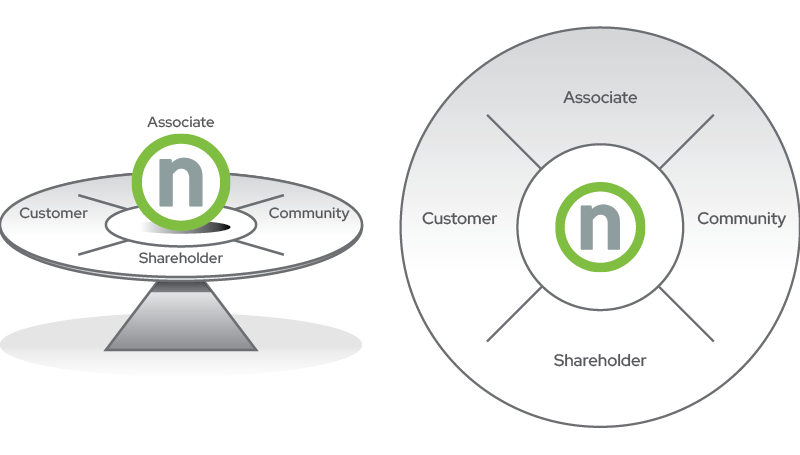Matching an Investment Strategy to Core Values for Success
Nelnet’s investment philosophy differs from those held by the majority of other publicly held companies—and it doesn’t appeal to all types of investors. There’s definitely a shared DNA between Nelnet’s investment philosophy and how closely it’s tied to the organization’s business approach and core values. That’s what makes this investment strategy most unique.
According to Nelnet Founder and Executive Chairman of the Board Mike Dunlap, the goal is for each Nelnet shareholder to record a gain or loss in market value proportional to the gain or loss in per-share fundamental (intrinsic) value recorded by the company. This requires the organization to strive to maintain a one-to-one relationship between the company’s fundamental value and market value. Bottom line: Dunlap wants to see Nelnet’s stock price at a fair level rather than an artificial level. Why?
If you’re a momentum investor where you want to get on the train and jump on for a while and jump off, then maybe Nelnet isn’t for you. But if you’re looking for an investment that creates long-term value, then that’s the type of company and investment we are.
As Dunlap explains, keeping Nelnet’s stock price at a fair level aligns with the organization’s long-term approach to its business model and market value. Sometimes, however, Mrs./Mr. Market will overvalue or undervalue the investment style they currently love. In the short term, the market can be a voting machine, but in the long run it’s a weighing machine, and long-term value will win out.
Nelnet businesses have all built a strong reputation on forging long-term relationships. With that as a key part of Nelnet’s corporate identity, it stands to reason that long-term perspective would be integral to the organization’s investment philosophy. Conversations with Dunlap and Nelnet’s other executives make it clear that the organization’s investment philosophy and business approach are closely aligned—and that you can’t talk about either of them without bumping up against Nelnet’s core values.
Nelnet’s Core Values
The Evolution of Nelnet’s Investment Strategy
Besides integrating a long-term perspective and Nelnet’s core values, Nelnet’s investment philosophy incorporates other ideas and strategies. For instance, Dunlap’s reading of the Warren Buffett Partnership Letters and Berkshire Hathaway annual reports during law school also helped to shape the organization’s business and investment philosophies over the years.
As Dunlap emphasizes, “When I worked at Union Bank for 20 years, we had three goals. First and foremost, the customer had to be number one. You can’t put the employee in front of the customer or none of us will be here. Second, you want to create a great environment for your associates and give them the tools and resources they need to be successful. The third goal of the bank was diversification, but that didn’t come from Buffett.”
If you want to be a long-term player in business, the world’s going to change. You better diversify your revenue stream because you never know what’s going to happen with your business.
As a prime example, Dunlap points out that the College Cost Reduction Act in 2007 took 90% of the profit margin out of Nelnet’s Federal Family Education Loan Program (FFELP) business. Then in 2010, FFELP was eliminated completely. “If we hadn’t been future-focused and diversified [beyond owning and servicing FFELP student loans], we’d probably be out of business,” notes Dunlap.
The Origins of the Six Tenets of Nelnet’s DNA
These six tenets of Nelnet’s DNA make up its investment philosophy and business approach—and help make the organization stand out among competitors.
Dunlap reflects on how these ideas came to be incorporated into the organization’s philosophies.
- “Long-term perspective came from the bank. It’s not what our quarterly earnings or our annual earnings are, it’s what the next quarter century is going to be – not the next quarter.”
- “Economic Moat is about differentiating yourself from competitors – and that comes from a mix of the bank, Ben Graham, and Buffett.”
- “Discounted cash flow is one that really comes from Ben Graham as he presented it in his books The Intelligent Investor and Security Analysis. I had these in graduate school, and if you’re going to create real value, you need to create cash flow.”
- “Being opportunistic and contrarian came from the bank, but I think Buffett also looks at that as an investment style.”
- “Diversification came from the bank – and we already talked about this as simply being necessary for long-term survival.”
- “Debt – I would say coming from the bank, you know you have to be careful how much you leverage and if you think about all your loan customers, you don’t want to overleverage your customers because they’re not going to be able to be successful.”
How Nelnet’s leadership uses these concepts today has been shaped by multiple decades of experience in business, additional perspective from having experienced people in key positions in the organization and on the Nelnet board, and from observing market trends. Dunlap adds, “Nobody patented these ideas. These aren’t rocket science ideas, but if you stick to them, you could have success over time.”
Balancing Stakeholders, Growth Mentality, and Open Communication
As Dunlap explains, “The other piece of this that’s important is making sure you have a balance between the customer, associates, the community, and the shareholder. You can’t forget about any one of those constituents. You have to keep them all in balance or it’s going to hurt you in the long term.”
If associates lack the resources needed to properly support customers, service will suffer, and profits will be impacted. If customers are prioritized to the detriment of associates, the company will struggle to retain associates and become operationally inefficient. If too much emphasis is placed on making associates and customers happy without regard for the bottom line and meeting the needs of shareholders, the long-term growth and stability of the company are at stake.
Nelnet’s commitment to giving back to the communities in which we live and work is a core value that is backed by meaningful actions such as supporting associates to volunteer time and generously matching employee gifts. Since it was formed in 2004, the Nelnet Foundation has granted over $25 million to hundreds of organizations that improve lives in our communities.
As Dunlap emphasizes, “When all of these constituencies are in balance, they form something like a horizontal flywheel. As the momentum increases, the flywheel goes around faster and faster. You can drive off the momentum like a spinner.”

Possibly the most common issue for large, publicly held companies is taking a short-sighted view of the market in order to make shareholders happy. That’s where Nelnet’s focus on serving customers and associates—as well as shareholders and communities—as part of the organization’s core values is a key differentiator.
Read more on this topic in the second of this two-part series, where we dive deeper into the six tenets of Nelnet’s DNA. We also explore how Nelnet’s investment philosophy and business strategy reflect these principles.



